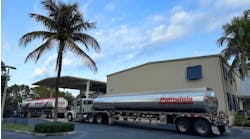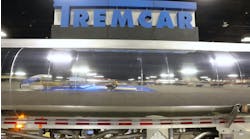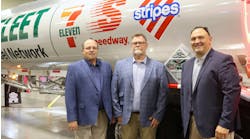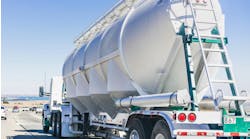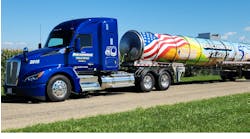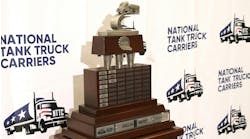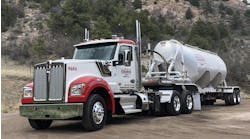Eagle Transportation helps keep the grape juice and wine flowing in support of Napa Valley’s wine industry
WINE producers across California’s Napa Valley are reporting average grape yields with good acidity and moderate Brix (a measurement of sugar content in wine grapes). Berry weights are up across the board, and outstanding quality is being reported.
All of this is good news for Eagle Transportation Co Inc, which specializes in serving wine producers in the Napa Valley region. The Santa Rosa, California-based trucking company runs 30 company tractors and six owner-operator tractors, 17 tank trailers, and 30 van trailers.
“We are a niche carrier that is fully dedicated to wine-making operations in the Napa Valley region,” says Mike Brady, co-owner of Eagle Transportation Company. “This has become such a complex business that we are hauling loads of wine and wine-making supplies year-round for the growers and wine makers. We currently employ about 30 company drivers, as well as six owner-operators, and we could use at least 10 more drivers if we could find them.”
“At the busiest times of the year, we’re handling 25 to 30 tank loads a day and 60 to 70 van loads a day. Wine making in Napa Valley is a tight-knit community, and we have developed a very good working relationship with winery operators over the years.
“They are our friends and neighbors. My wife and I even have an eight-and-a-half acre vineyard that produces 32 to 42 tons of Pinot Noir grapes annually.”
Big business
With a range of large and small producers, wine production has become big business in Napa Valley. The value of the 2018 grape harvest was approximately $2.1 billion for the four-county region that includes Sonoma, Napa, Lake, and Mendocino.
With more than 400 wineries in the Napa Valley, and California as a whole producing 90% of all US wines, wine and bottle distribution is big business. It definitely has become year-round business.
Eagle Transportation Company has been a part of the winemaking scene since the late 1970s. “The original owners had started the company in 1977, as a spin-off of a beer distributorship in the Santa Rosa area,” Brady says. “Over time, the company branched out into the wine industry—transporting juices, wine and bottles—plus we did warehousing. It made a lot of sense, since we were in the heart of wine country. That side of the business just grew from there.”
In October 2015, Mike, his wife Kim, and Jeannette Moneymaker purchased Eagle Transportation Company from the previous owners. Mike and Moneymaker had each worked for the company for roughly 30 years. Mike’s first 10 years at Eagle Transportation Company was as a driver.
From driving, Mike moved into dispatch with Moneymaker. There, they developed tight relationships with customers, and developed a transportation system that kept loads flowing.
Today, Mike directs tanker operations while Moneymaker focuses on van trailer activity. Kim serves as treasurer and office manager.
“Ninety percent of our operation is within a 75-mile radius of Santa Rosa,” Moneymaker says. “But we have runs down to Santa Maria on the California coast and as far as Bakersfield in the Central Valley, which is about six hours away. We operate 6,500-gallon tankers for bulk wine, as well as dry vans for glass, finished case goods, and barrels of wine.”
Grape harvest
Tank operations really ramp up with the grape harvest that starts in August and runs for about two months, according to Mike. The lighter grapes for Champaign, Chardonnay, and such are harvested first, followed by the heavier red grapes.
“After the grapes are harvested and crushed, we begin moving the juice in bulk to processing facilities for fermentation,” Mike says. “At the peak of the season, we’ll have 17 tank transports running six days a week. Much of the grape juice comes from custom crush facilities in the region, and haul it wherever our customers tell us to.
“We have a mix of loads through the rest of the year. This includes using van trailers to move barrels of aging wine from one facility to another. We can load 76 barrels into each 53-ft trailer.”
From February to March, Eagle Transportation moves a lot of bottled wine in van trailers. During July and August, as the next grape harvest season approaches, wine makers empty product from storage tanks and ship it by tank trailer to bottling plants. Wine in bottles and barrels is shipped from warehouses where it has been stored in the Napa region. It’s all to make room for the next harvest.
The process of loading and unloading tank trailer loads of grape juice and wine takes 45 minutes to an hour. All of the pumps and hoses are at the customer locations. Trucks and trailers have no product-handling equipment. Most of the van trailer movements are dock to dock.
Tank cleaning
Shipments of finished wine are sealed. Tank trailers are cleaned after every load, and many wineries do a swab test before loading the next shipment.
If the next shipment will be the same grape variety, the tank is cleaned with hot water and sanitizer. When the trailer is shifted from red wine to white, the tank gets a foodgrade caustic wash. In addition, gaskets for the domelids and valves are replaced as needed.
Serving the winemaking industry provides plenty of work for the Eagle Transportation drivers. Some of the drivers work with both tank trailers and vans. Most have been with the carrier for a long time.
In the face of strong customer demand, the carrier is working hard to add more drivers. Drivers must have at least two years of tractor-trailer experience, and many are in their mid-30s.
“We look for tanker experience, and we do find some tanker drivers who want the local work,” Mike says.
Since all operations are within California, drivers use time cards and paper logs. The Fleetmatic on-board computer used by the carrier is e-log capable. The system monitors truck operations and provides shipment-tracking capabilities that are requested by some customers.
Peterbilt tractors
Eagle Transportation provides its company drivers with Peterbilt tractors. The newest units are Model 579s, but the carrier still runs a few longnose 379s. Most are daycabs, but a couple have 48-inch sleepers.
Mike has always been a Peterbilt fan. “We’re in this business for the long-haul,” he says. “We wanted Peterbilts to showcase our company. Image is big in the wine industry and our trucks—with our company colors and graphics—represent us through branding and reputation. They stand out. What’s more, being a former driver myself, I know the importance of a high quality truck for our drivers. I still drive on occasion, so I wanted the comfort and image that Peterbilt offers, and our other drivers want that too.”
One of the biggest challenges the Bradys and Moneymaker faced when they purchased Eagle Transportation was the age of the tractor fleet. In addition, the carrier was running 10 to 12 rental tractors at the time.
“For us, we didn’t think that was optimal, plus our owned trucks were various ages, and some did not meet CARB (California Air Resource Board) emission compliance,” Mike says. “We knew we needed new trucks—we didn’t want to rent—and we needed a plan going forward. It was a foggy picture at the time.
“The local PacLease branch really opened our eyes to all the possibilities of leasing. Bill Russell (executive account manager at Coast Counties Peterbilt PacLease) knew I was a staunch advocate of owning and maintaining our truck and trailer fleet. But he showed us leasing was a better fit. He looked at our business model, saw where we were and where we wanted to go; he helped us achieve our goals. The key was that leasing would allow us to get into new Peterbilt equipment, allowing us to grow our business while retaining precious operating capital.
“It also allowed us to re-deploy our truck maintenance staff to handle general maintenance on our owned, less technical trucks and trailer equipment. Ongoing advancements in truck technology make it difficult, if not impossible, for a fleet of our size to hire, train and retain qualified technicians. It made sense for PacLease to handle our truck maintenance—they have economies of scale and direct factory support. They are on the front line. If they can’t fix it off the back of their mobile service truck then they fall back to the resources of the dealership service support team.”
Currently, Eagle Transportation owns half of its company fleet and leases the other half. “That’s a good balance for us right now,” Mike says.
The newest Model 579s were spec’d with the multi-torque (1550-1750 lb) PACCAR MX-13 engine, rated at 455 horsepower, and driven through the PACCAR 12-speed automated transmission. Tractors also have the Bendix Wingman Fusion safety technology package, air-disc brakes, and SmarTire tire pressure monitoring system.
One of the more specialized units in the Eagle Transportation fleet is a truck-and-trailer tanker combination that Mike has nicknamed the “mountain goat.” The 6,500-gallon truck and trailer has a three-compartment truck tank and two-compartment pull trailer. The unit is used to serve customers located in areas that are difficult to access.
With few exceptions, the tank trailers in the fleet were built by West-Mark. Most of the 6,500-gallon double-conical sanitary stainless steel tank trailers are uninsulated. The carrier runs a mix of straight barrel, two-compartment, and three-compartment trailers.
“We like uninsulated trailers because they give us more cargo capacity,” Mike says. “An uninsulated tank is about 2,200 pounds lighter than an insulated tank. We can load our tanks to almost full, which minimizes surge. The chilled wine holds its temperature for the short hauls, and there is little or no opportunity for product expansion due to warming.”
With the grape harvest now fully underway, the Eagle Transportation fleet is running hard. After all, it looks like it will be another strong year for wine production in the Napa Valley.
